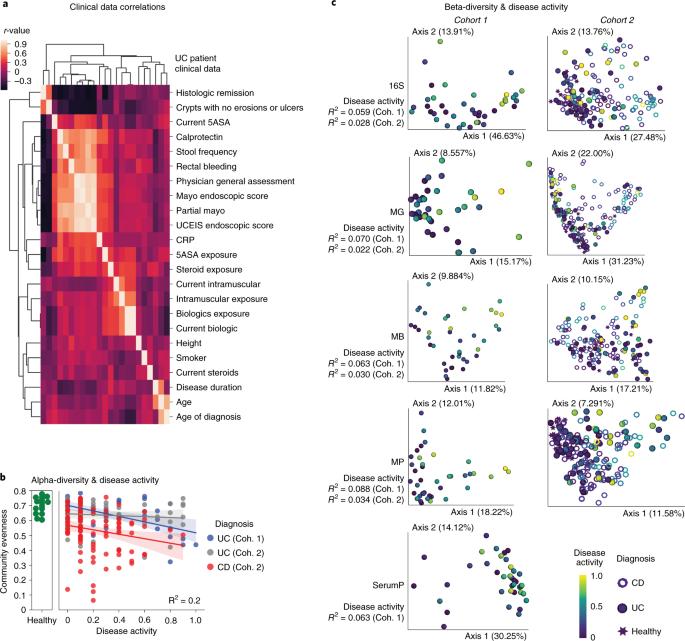溃疡性结肠炎肠道微生物组的多组学分析将硫杆菌蛋白酶与疾病严重程度联系起来
IF 19.4
1区 生物学
Q1 MICROBIOLOGY
引用次数: 62
摘要
溃疡性结肠炎(UC)是由宿主-微生物群平衡紊乱引起的,但目前的治疗方法只针对宿主炎症通路。为了了解宿主与微生物群之间的相互作用是如何在 UC 中发生紊乱的,我们收集并分析了一个炎症性肠病中心 40 名 UC 患者的六个基于粪便或血清的 omic 数据集(粪便样本的元蛋白组、元代谢组、元基因组、元肽组和扩增子测序图谱以及血清样本的蛋白质组图谱),以及疾病活动的各种临床、内窥镜和组织学指标。另外还收集了 210 份验证样本(73 份 UC、117 份克罗恩病和 20 份健康对照),并分别进行了独立分析。两个队列的数据整合显示,临床活跃的 UC 患者中有一部分人体内存在过量的蛋白酶,而这些蛋白酶来源于硫杆菌(Bacteroides vulgatus)。为了检验硫杆菌蛋白酶是否导致了 UC 疾病的活动,我们首先分析了在患者和细菌培养物中发现的硫杆菌蛋白酶。使用广谱蛋白酶抑制剂可改善硫杆菌在体外诱导的屏障功能障碍,并可预防硫杆菌单核化、IL10缺陷小鼠的结肠炎。此外,将含有大量 B. vulgatus 蛋白酶的 UC 患者粪便移植到无菌小鼠体内会诱发依赖于蛋白酶活性的结肠炎。这些来自多组学方法的结果加深了人们对驱动UC的功能性微生物群改变的理解,并为确定可作为治疗该疾病的一种策略加以抑制的其他途径提供了资源。对溃疡性结肠炎患者粪便样本的多组学分析揭示了硫杆菌蛋白酶活性与疾病症状严重程度之间的联系。本文章由计算机程序翻译,如有差异,请以英文原文为准。

Multi-omics analyses of the ulcerative colitis gut microbiome link Bacteroides vulgatus proteases with disease severity
Ulcerative colitis (UC) is driven by disruptions in host–microbiota homoeostasis, but current treatments exclusively target host inflammatory pathways. To understand how host–microbiota interactions become disrupted in UC, we collected and analysed six faecal- or serum-based omic datasets (metaproteomic, metabolomic, metagenomic, metapeptidomic and amplicon sequencing profiles of faecal samples and proteomic profiles of serum samples) from 40 UC patients at a single inflammatory bowel disease centre, as well as various clinical, endoscopic and histologic measures of disease activity. A validation cohort of 210 samples (73 UC, 117 Crohn’s disease, 20 healthy controls) was collected and analysed separately and independently. Data integration across both cohorts showed that a subset of the clinically active UC patients had an overabundance of proteases that originated from the bacterium Bacteroides vulgatus. To test whether B. vulgatus proteases contribute to UC disease activity, we first profiled B. vulgatus proteases found in patients and bacterial cultures. Use of a broad-spectrum protease inhibitor improved B. vulgatus-induced barrier dysfunction in vitro, and prevented colitis in B. vulgatus monocolonized, IL10-deficient mice. Furthermore, transplantation of faeces from UC patients with a high abundance of B. vulgatus proteases into germfree mice induced colitis dependent on protease activity. These results, stemming from a multi-omics approach, improve understanding of functional microbiota alterations that drive UC and provide a resource for identifying other pathways that could be inhibited as a strategy to treat this disease. Multi-omics analyses of faecal samples from patients with ulcerative colitis reveal a link between Bacteroides vulgatus protease activity and severity of disease symptoms.
求助全文
通过发布文献求助,成功后即可免费获取论文全文。
去求助
来源期刊

Nature Microbiology
Immunology and Microbiology-Microbiology
CiteScore
44.40
自引率
1.10%
发文量
226
期刊介绍:
Nature Microbiology aims to cover a comprehensive range of topics related to microorganisms. This includes:
Evolution: The journal is interested in exploring the evolutionary aspects of microorganisms. This may include research on their genetic diversity, adaptation, and speciation over time.
Physiology and cell biology: Nature Microbiology seeks to understand the functions and characteristics of microorganisms at the cellular and physiological levels. This may involve studying their metabolism, growth patterns, and cellular processes.
Interactions: The journal focuses on the interactions microorganisms have with each other, as well as their interactions with hosts or the environment. This encompasses investigations into microbial communities, symbiotic relationships, and microbial responses to different environments.
Societal significance: Nature Microbiology recognizes the societal impact of microorganisms and welcomes studies that explore their practical applications. This may include research on microbial diseases, biotechnology, or environmental remediation.
In summary, Nature Microbiology is interested in research related to the evolution, physiology and cell biology of microorganisms, their interactions, and their societal relevance.
 求助内容:
求助内容: 应助结果提醒方式:
应助结果提醒方式:


